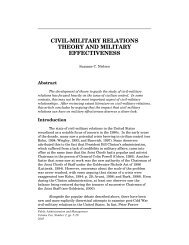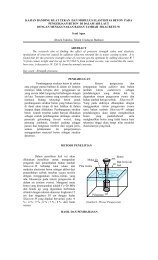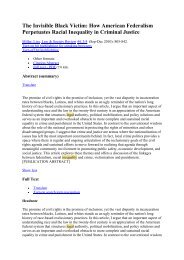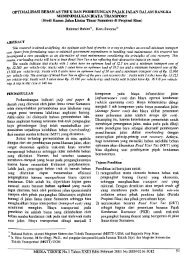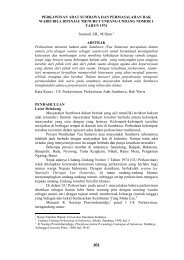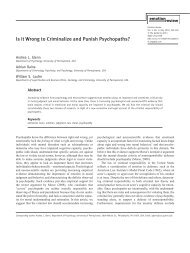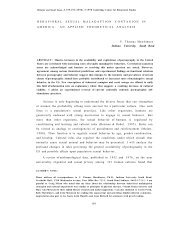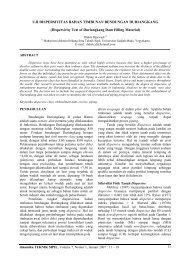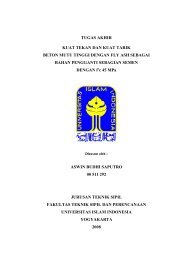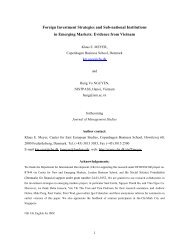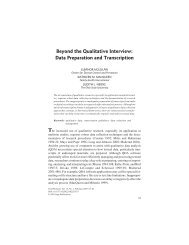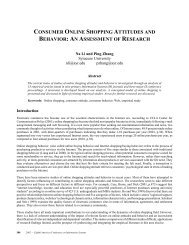Ski – resort and regional development: profile of visitors ... - E-Journal
Ski – resort and regional development: profile of visitors ... - E-Journal
Ski – resort and regional development: profile of visitors ... - E-Journal
Create successful ePaper yourself
Turn your PDF publications into a flip-book with our unique Google optimized e-Paper software.
146<br />
Yao-Yi Fu, Am<strong>and</strong>a K. Cecil, Suosheng Wang, Sotiris H. Avgoustis<br />
METODOLOGY<br />
A questionnaire survey <strong>of</strong> accommodation establishments in the city was undertaken to assess<br />
the underst<strong>and</strong>ing <strong>and</strong> the level <strong>of</strong> implementation <strong>of</strong> sustainable tourism in South Part. The<br />
questionnaire obtained information relating to the underst<strong>and</strong>ing <strong>of</strong> sustainable tourism, the<br />
adoption <strong>of</strong> sustainable practices, the awareness <strong>and</strong> use <strong>of</strong> the Environmental Monitoring<br />
Agency <strong>and</strong> the characteristics <strong>of</strong> the respondents (size <strong>of</strong> accommodation, price range, <strong>and</strong><br />
type <strong>of</strong> business, age <strong>and</strong> length <strong>of</strong> ownership). The sampling strategy was based on the<br />
“Region Guide”, which detailed accommodation united registered with the Prefecture Marketing<br />
Bureau. The sample was stratified according to the size <strong>of</strong> business based on the number <strong>of</strong><br />
rooms (i.e. small, 1-10 bedrooms; medium 11-50 bedrooms; large, more than 50 bedrooms).<br />
Initially, the hotels <strong>and</strong> guesthouses listed were contacted by telephone in order to ascertain<br />
their willingness to take part in the survey. On the 100 businesses listed in the guide, 74 per<br />
cent agreed to participate. The survey took place on a face-to-face basis over the period 10<br />
March to 17 March 2005. This period proved to be advantageous because it was low season<br />
<strong>and</strong> hoteliers could afford the time to answer questions. The sample included over three-fifths<br />
<strong>of</strong> each size category.<br />
RESULTS<br />
The survey has indicated that, despite the support provided by Prefecture Marketing Bureau<br />
<strong>and</strong> the framework <strong>of</strong> the Environmental Monitoring Agency, the underst<strong>and</strong>ing <strong>of</strong> the concepts<br />
behind sustainable tourism remains at a low level amongst tourist accommodation operators<br />
in the city. In this respect, the survey supports the findings <strong>of</strong> previous research where<br />
operators’ awareness <strong>and</strong> appreciation <strong>of</strong> the concept were limited. In the present survey, the<br />
term “sustainable tourism” was interpreted by most businesses as the short-term preservation<br />
<strong>of</strong> the tourist industry in terms adoption <strong>of</strong> sustainable practices within the sample population<br />
was also relatively modest, being dominated by activities that might be established priorities,<br />
such as energy conservation.<br />
Another key factor in the adoption <strong>of</strong> sustainable practices is the potential <strong>of</strong> customer<br />
requirements to influence the operation <strong>of</strong> the industry. Operators suggested that very few<br />
guests show any regard for environmental practices carried out in the hotels, <strong>and</strong> usually only<br />
require a “clean, comfortable bed” <strong>and</strong> a “good breakfast”. I suggest that guests may be willing<br />
to pay higher prices for environmentally less damaging products, although a survey carried<br />
out in the region indicated that, whilst 71 per cent <strong>of</strong> those interviewed said that they would<br />
prefer to stay in hotels that show concern for the environment, they were not willing to pay<br />
extra to fund these green policies. Therefore, it seems that from the point <strong>of</strong> view <strong>of</strong> running<br />
a business, there is very little incentive for those who are making an effort to continue to do<br />
so. The introduction <strong>of</strong> sustainable management in accommodation businesses remains largely<br />
unsupported by both public <strong>and</strong> private sector infrastructure <strong>and</strong> is <strong>of</strong> little concern to the<br />
paying guest. The translation <strong>of</strong> the concept <strong>of</strong> sustainable <strong>development</strong> from theory into<br />
practice in tourism remains a long-term commitment, as in other areas <strong>of</strong> the economy.<br />
Tourism Today - Fall 2007 - Full Paper



